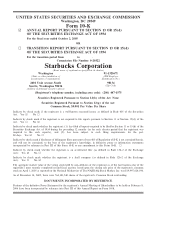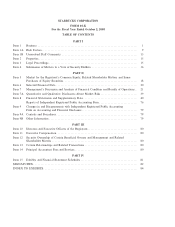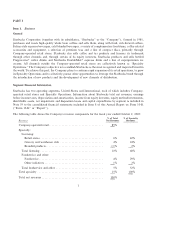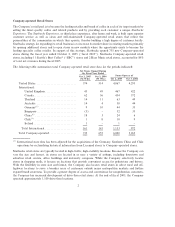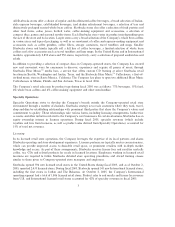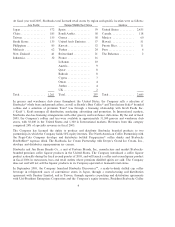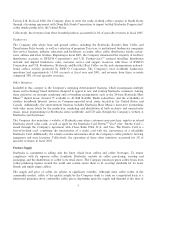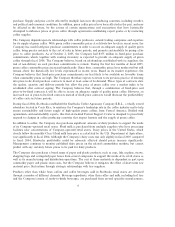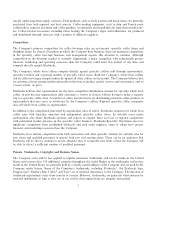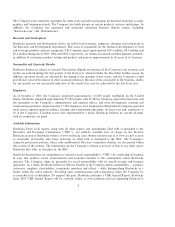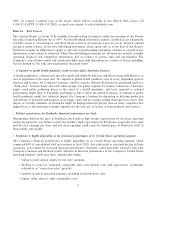Starbucks 2005 Annual Report Download - page 5
Download and view the complete annual report
Please find page 5 of the 2005 Starbucks annual report below. You can navigate through the pages in the report by either clicking on the pages listed below, or by using the keyword search tool below to find specific information within the annual report.All Starbucks stores offer a choice of regular and decaffeinated coffee beverages, a broad selection of Italian-
style espresso beverages, cold blended beverages, iced shaken refreshment beverages, a selection of teas and
distinctively packaged roasted whole bean coffees. Starbucks stores also offer a selection of fresh pastries and
other food items, sodas, juices, bottled water, coffee-making equipment and accessories, a selection of
compact discs, games and seasonal novelty items. Each Starbucks store varies its product mix depending upon
the size of the store and its location. Larger stores carry a broad selection of the Company's whole bean coffees
in various sizes and types of packaging, as well as an assortment of coffee and espresso-making equipment and
accessories such as coffee grinders, coffee filters, storage containers, travel tumblers and mugs. Smaller
Starbucks stores and kiosks typically sell a full line of coffee beverages, a limited selection of whole bean
coffees and a few accessories such as travel tumblers and logo mugs. In the United States and in International
markets, approximately 2,850 stores and 950 stores, respectively, carry a selection of prepared sandwiches and
salads.
In addition to providing a selection of compact discs in Company-operated stores, the Company has created
new and convenient ways for consumers to discover, experience and acquire all genres of music through
Starbucks Hear Music
TM
media bars, a service that offers custom CD burning at select Starbucks retail
locations in Seattle, Washington and Austin, Texas, and the Starbucks Hear Music
TM
Coffeehouse, a first-of-
its-kind music store in Santa Monica, California. The Company has plans to open two additional Hear Music
Coffeehouses in Miami, Florida and San Antonio, Texas in fiscal 2006.
The Company's retail sales mix by product type during fiscal 2005 was as follows: 77% beverages, 15% food,
4% whole bean coffees and 4% coffee-making equipment and other merchandise.
Specialty Operations
Specialty Operations strive to develop the Company's brands outside the Company-operated retail store
environment through a number of channels. Starbucks strategy is to reach customers where they work, travel,
shop and dine by establishing relationships with prominent third parties that share the Company's values and
commitment to quality. These relationships take various forms, including licensing arrangements, foodservice
accounts and other initiatives related to the Company's core businesses. In certain situations, Starbucks has an
equity ownership interest in licensee operations. During fiscal 2005, specialty revenues (which include
royalties and fees from licensees, as well as product sales derived from Specialty Operations) accounted for
15% of total net revenues.
Licensing
In its licensed retail store operations, the Company leverages the expertise of its local partners and shares
Starbucks operating and store development experience. Licensee partners are typically master concessionaires,
which can provide improved access to desirable retail space, or prominent retailers with in-depth market
knowledge and access. As part of these arrangements, Starbucks receives license fees and royalties and sells
coffee, tea, CDs and related products for resale in licensed locations. Employees working in licensed retail
locations are required to follow Starbucks detailed store operating procedures and attend training classes
similar to those given to Company-operated store managers and employees.
Starbucks opened 596 new licensed retail stores in the United States during fiscal 2005, and as of October 2,
2005, operated 2,435 licensed stores. During fiscal 2005, Starbucks opened 341 new International licensed stores,
including the first stores in Jordan and The Bahamas. At October 2, 2005, the Company's International
operating segment had a total of 1,806 licensed retail stores. Product sales to and royalty and license fee revenues
from U.S. and International licensed retail stores accounted for 42% of specialty revenues in fiscal 2005.
3

